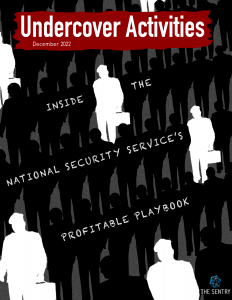 Read the full report and recommendations
Read the full report and recommendations
 Read the summary
Read the summary
In a country plagued by horrific violence and rampant corruption, South Sudan’s National Security Service (NSS) stands out as particularly ruthless, secretive, and well-funded. Fear of the NSS is pervasive in South Sudan, and for good reason.* Its personnel have been involved in widespread, grave human rights abuses, including kidnapping, torture, and illegal detention,* and the organization operates without regard for basic human rights or the personal rights of civilians laid out in the South Sudanese constitution, including freedom of assembly, freedom from torture, and the rights to fair trial and litigation.*
The Sentry found that, to cement its control and power in South Sudan, the NSS has employed a two-pronged strategy of state capture and repression. Corporate records reviewed by The Sentry reveal a vast network of companies with NSS shareholders, ranging from media and publishing to natural resources and logistics. The oil, finance, and media sectors particularly suffer from NSS involvement both in terms of economic capture and repression. NSS personnel have occupied key posts in state institutions, and the NSS itself has had a role in approving private company operations in the lucrative mining and security sectors. In this way, the NSS has been able to access off-budget finances and diverted revenues, all while sidestepping oversight and operational scrutiny.
In turn, the NSS has funded a campaign of surveillance, intimidation, and horrific violence against civilians, activists, and journalists. The NSS has interfered with civil society and the press, suppressed freedom of speech, and illegally detained and permanently silenced those who spoke out against the regime. In interviews with The Sentry, several South Sudanese in civil society organizations and in the media sector expressed concern that they might be targeted by the NSS if they spoke openly about corruption or other government issues.* *
Operating under the supervision of President Salva Kiir, the NSS and its activities have gone far beyond their original remit, largely unchecked. This has created a vicious cycle in which a highly militarized agency has gained ever more power and wielded it with increasing brutality.* *
In order to end the NSS campaign of egregious human rights abuses and economic capture, decisive action must be taken to curb its powers of detention and arrest, cut off the sources of its off-budget revenue, and ensure civilian oversight mechanisms are established, empowered, and effectively implemented. Civil society and the media must be protected so that they can hold the NSS and the government accountable, and the government of South Sudan must enforce its own constitution,* which demands that the NSS respect human rights, democracy, and civilian oversight—the very cornerstones of a promising future for the people of South Sudan.
Key recommendations
- The government of South Sudan should immediately close all NSS detention centers and ensure that the NSS releases all detainees who have not been charged with a crime or given a fair trial. There should be an immediate, transparent, and impartial investigation into all allegations of NSS misconduct, including allegations of torture and sexual violence. The government should ensure that those NSS officials implicated in such crimes are appropriately prosecuted.
- The United States, United Kingdom, European Union, Canada, and Australia should urgently investigate and, if appropriate, impose coordinated and targeted network sanctions on the individuals and entities described in this report, particularly the NSS-owned or -controlled commercial enterprises, as well as Akol Koor Kuc, Jalpan Obyce, Akot Lual Arech, and their enablers and support networks, pursuant to their Global Magnitsky-style or South Sudan-specific sanctions authorities.
- Financial institutions should take measures to identify accounts held or beneficially owned by members of the NSS, other senior South Sudanese politically exposed persons (PEPs), and the 125 companies revealed by The Sentry to have NSS shareholders. They should carry out a comprehensive assessment to identify their broader international networks and determine the measures needed to mitigate the risks involved in such accounts and customer relationships. Financial institutions should also undertake enhanced screening, ongoing monitoring, and transaction reviews to identify, investigate, and report potentially suspicious financial activity related to South Sudan, especially with respect to international networks profiting from such activity.
Read the full report and recommendations >
* Note: This report was updated to include additional information provided to The Sentry by Akot Lual Arech.

